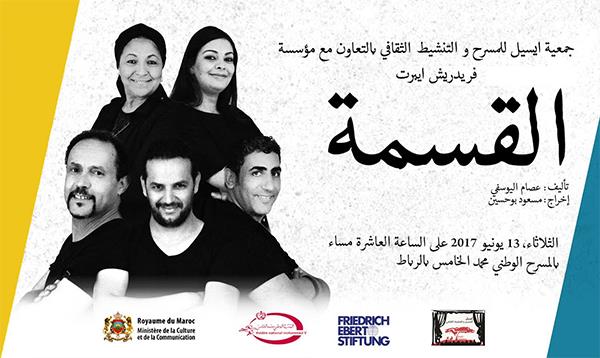
Morocco- Theatre: 'Kasma' Explores Women's Inheritance Injustice
Beside entertaining the public, theater always played a key role in raising political and social issues that directly touch society. The play "Kasma" managed to achieve that with flying colors yesterday in Mohammed V National Theater in Rabat.
The fable of this play is built around several stories of different families who live a set of conflicts and tensions related to sharing inheritance. In all these micro-stories, human relationships are defined through the social and family status of each member. The relationship and the rights of the family legacy in all its forms trigger in a transverse way tensions that reveal a certain injustice.In all the four chapters of the play, women are at the heart of this injustice. Victims of greed, unfair social dogmas, vague legislative laws, sexism and gender inequality, the play highlights the dark reality of the status of women when it comes to inheritance.
This unique initiative debates this serious matter in an artistic way. With a humoristic and satirical touch, the five Moroccan artists fight against this taboo and break a social mold that has been for years oppressing the rights of women. But instead of giving concrete solutions to this scourge, the play sparks a debate, embodying the psychological, economic and social consequences of gender inequality.The audience was left with a bitter sense of injustice, seeing how an uncle's greed pushes his niece to live in the streets, how the carelessness of parents leaves their adoptive daughter homeless, and how a father in his deathbed despairs when faced with the dark future of his special-needs child.
The room was filled with laughter at times, tears at others, but indignation was ever-present throughout the packed rows of daughters, mothers and wives.Raising legitimate and prickly questions that have always been the center of social and religious debate, the play stays clear from Quranic verses, focusing on the diligence on the many and sometimes controversial fatwas of Muslim scholars.
A Plea for JusticeIslamic diligence on the matter of inheritance has always created great strife between fundamental laws and Islamic teachings, causing a great deal of confusion which have repeatedly lead to injustice, especially towards women.
Mohamed Abdelwahab Rafiqi, better known as Abou Hafs, didn't shy away from pointing this issue in a statement at the end of the play. "We can no longer rely on a judgment made 15 centuries ago."The ex-Salafi founder of the Al Mizane media platform to fight against religious extremism, Rafiqi's position in favor of opening a debate on equality between men and women in inheritance has more than once sparked the ire of many Moroccan salafists.
"Islam has always strived to achieve justice and equality, but our reality todays relies another story. It is time to take action, legal and social one. We must raise awareness about an issue that touches half of our society," said Rafiqui."Times have changed. Our culture have changed. Away has gone the time where uncles and nephews took in charge the women of their family. Nowadays, most of our society is composed of nuclear families. It is nonsense for distant relatives to show up at the death of a family member to ask for their due!"
Also speaking at the event, law professor Mounir Founani wondered why is it taking so long for our courts to take serious action and fix the legal loopholes that cause an acute injustice in our society. "Why are we so afraid from making reforms that would deliver justice to our citizens?"It is absurd, added Founani, that so many people are hesitant to reform the laws out of fear of blasphemy. "Many of the texts that spark this huge strife do not even emanate from the Quran. It is mainly the fatwas of some Muslim scholars inspired from the Sunnah that are the source of this issue."
"The law is supposed to achieve social justice, yet our courts fail to do so in many cases. More than once have we seen women kicked out of the home their husbands left them, the home they helped built with their time and money and effort, for it to be sold and the money to be given to the cousin they have never seen," Founani said. "Worse, the court will in fact hand distant relatives what they perceive as their legitimate right, ensured by tradition and religion."The subject is still problematic because it poses many complexities in terms of societal, religious and cultural issues. The play's team was able to present the issue boldly, while respecting the culture of our society and its distinct characteristics, as far as realistic social situations are concerned.

Legal Disclaimer:
MENAFN provides the
information “as is” without warranty of any kind. We do not accept
any responsibility or liability for the accuracy, content, images,
videos, licenses, completeness, legality, or reliability of the information
contained in this article. If you have any complaints or copyright
issues related to this article, kindly contact the provider above.















Comments
No comment